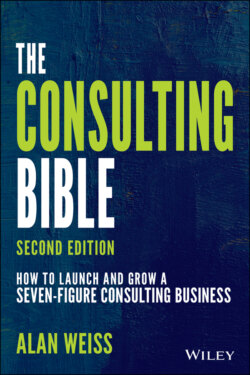Читать книгу The Consulting Bible - Alan Weiss - Страница 16
The Gospel
ОглавлениеA market plan will move you forward. A business plan will kill you, because you'll hit it.
Success means having an evolving marketing plan that you tend to daily. Since many aspects of it are passive, you can take long vacations and still have it work for you. But success doesn't ever mean having a business plan, since these are notoriously inaccurate and become dismal, self‐fulfilling prophesies.
If you plan to increase your revenues by 20 percent, or bring on four new clients, or expand your virtual presence, you may just do that—at the expense of having done much more! You don't want to increase revenue by 20 percent; you want to maximize revenue, maximize new client acquisition, and expand your web presence.
When I was being interviewed by the then‐CEO of State Street Bank for a $350,000 assignment, he said to me, “We've increased net new revenues by 22 percent compounded annually over my watch, the last five years. Why do we need you?” In the next three seconds I was going to make or not make a third of a million dollars for me.
I said to him, “How do you know it shouldn't have been 34 percent?”
He thought for just a moment, smiled, and said, “You're hired.”
Let's return to a familiar refrain: Real wealth is discretionary time. Money is merely fuel for that wealth. Ironically, many consultants chasing after success are like dogs chasing cars. They probably aren't going to catch the car and, if they do, what are they going to do with it? Ironically, too many people are busy earning so much money that they are actually eroding their wealth.
Now couple that premise with another tenet—TIAABB: there is always a bigger boat.
The point isn't to have the most; it's to have what you need for your purposes, assuming those purposes will grow as you do. Families, interests, philanthropies, friends, and other involvements usually demand more and elevated support as one matures. That's natural and expectable.
When we vacationed in St. Barth a few years ago, every major slip in the inner harbor was occupied: six yachts that had to be worth $25 million each tied up bumper to bumper like Hondas in a supermarket parking lot. Out in the bay were a dozen more that couldn't fit in the inner harbor, and couldn't be seen or appreciated.
There is always a bigger boat. The point is to be able to acquire the right boat for you at any given time and move on to new ones when appropriate for your needs, not someone else's needs or ego challenges to you.
I raise these attributes and philosophies of success early so that you can assimilate them as you learn the strategic and tactical approaches that follow in the chapters ahead. These are the generic parameters of success that I've observed and enjoyed over decades in this profession. The specific ones will depend on your lifestyle, your interests, and your intentions.
Finally, the best way to achieve success by any measure in the consulting profession is to be a generalist, not a specialist. The hackneyed refrain “Specialize or die” sounds like New Hampshire's license plate motto (“Live free or die”). Surely there is a middle ground!
My refrain is “Generalize and thrive.” It's a simple equation: The more prospective buyers you have, the more opportunity you have to close business. The more appealing you are to the more people, the more you will be sought.
Once you start adding adjectives to your value propositions, you continue to narrow your field until it will fit on the head of a pin. Which of these two value propositions is more appealing to more people?
1 We accelerate sales closing time while decreasing costs of acquisition.
2 We accelerate sales closing time while decreasing costs of acquisition in the New England, middle‐market, mortgage‐lending space.
The first will still interest the mortgage bankers. The second will interest only them.
